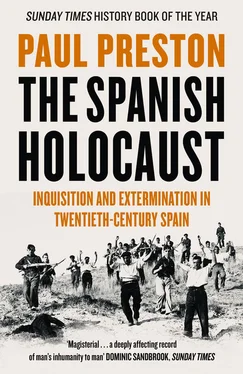Mola over-estimated the menace of the minuscule Spanish Communist Party, which he viewed as the tool of sinister Jewish–Masonic machinations. This reflected the credence that he gave to the fevered reports of his agents, in particular those of Santiago Martín Báguenas and of the sleazy and obsessive Julián Mauricio Carlavilla del Barrio. Mola’s views on Jews, Communists and Freemasons were also coloured by information received from the organization of the White Russian forces in exile, the Russkii Obshche-Voinskii Soiuz (ROVS, Russian All-Military Union) based in Paris. Thereafter, even when he was no longer Director General of Security, he remained in close contact with the ROVS leader Lieutenant General Evgenii Karlovitch Miller. Miller was, like the Nazi racial theorist Alfred Rosenberg, a Baltic German. Their hatred of communism reflected the fact that the Bolshevik revolution saw them lose their families, property, livelihood and homeland. Believing that the Jews had masterminded the revolution, they were determined to prevent them doing the same in western Europe. 25
When the Republic was established, convinced that he would be arrested for his work in defence of the monarchy, Mola went into hiding. Then on 21 April 1931, he gave himself up to the Minister of War, Manuel Azaña. Four days earlier, General Dámaso Berenguer had been arrested for his role in the Moroccan wars, as Prime Minister and later as Minister of War during the summary trial and execution of the two pro-Republican rebels Captains Fermín Galán and Ángel García Hernández. The arrests of Mola and Berenguer fed the right-wing perception of the Republic as vindictive. 26In the eyes of the Africanistas, Berenguer was being persecuted for his part in a war in which they had risked their lives, and for following military regulations in court-martialling the mutineers Galán and García Hernández. Similarly, they saw Mola as a hero of the African war who, as Director General of Security, had merely been doing his job of controlling subversion. The Africanistas were enraged that officers whom they admired were persecuted while those who had plotted against the Dictator were rewarded. The arrests gave Africanistas like Manuel Goded, Joaquín Fanjul, Mola and Franco a justification for their instinctive hostility to the Republic. They regarded the officers who received the preferment of the Republic as the lackeys of Jews and Freemasons, weaklings who pandered to the mob.
Awaiting trial for his use of excessive force against a student demonstration on 25 March, Mola was imprisoned in a ‘damp and foul-smelling cell’ in a military jail. 27Azaña arranged on 5 August for this to be changed to house arrest, but, unsurprisingly, seeing his recent targets now in positions of power, Mola nurtured a rancorous hostility to the Republic and a personal hatred of Azaña. The paranoid reports sent him by Carlavilla and the dossiers supplied by the ROVS convinced him that the triumph of the democratic regime had been engineered by Jews and Freemasons. In late 1931, in the first volume of his memoirs, he wrote of the threat of Freemasonry: ‘When, in fulfilling my duties, I investigated the intervention of the Masonic lodges in the political life of Spain, I became aware of the enormous strength at their disposal, not through the lodges themselves but because of the powerful elements that manipulated them from abroad – the Jews.’ Acción Española celebrated the appearance of the book with a rapturous nine-page review by Eugenio Vegas Latapié, one of the journal’s founders and a fierce advocate of violence against the Republic. 28
By the time that Mola came to write the second volume of his memoirs, he was more explicit in his attacks on Freemasons and Jews. He himself implied that this was because, in addition to the reports of General Miller, he had read both the work of Father Tusquets and The Protocols of the Elders of Zion. Thus Mola wrote that the coming of the Republic was a reflection of the hatred for Spain of the Jews and Freemasonry:
What rational motives exist to explain why we Spaniards excite the hatred of the descendants of Israel? Fundamentally three: the envy produced in them by any race that has a fatherland of its own; our religion for which they feel unquenchable revulsion because they blame it for their dispersion throughout the world; the memory of their expulsion, which came about not, as is often claimed, because of a King’s whim but because the people demanded it. These are the three points of the Masonic triangle of the Spanish lodges. 29
In December 1933, Mola wrote the conclusion to his bitterly polemical book El pasado, Azaña y el porvenir (The Past, Azaña and the Future), in which he gave voice to the widespread military animosity towards the Republic in general and towards Azaña in particular. Mortified by what he perceived as the unpatriotic anti-militarism of the left, he attributed it to various causes, mainly to the fact that:
decadent nations are the favourite victims of parasitical international organizations, used in their turn by the Great Powers, taking advantage of the situation in weak nations, which is where such organizations have most success, just as unhealthy organisms are the most fertile breeding ground of the virulent spread of pathological germs. It is significant that all such organizations are manipulated if not actually directed by the Jews … The Jews don’t care about the destruction of a nation, or of ten, or of the entire world, because they, having the exceptional ability to derive benefit from the greatest catastrophes, are merely completing their programme. What has happened in Russia is a relevant example and one that is very much on Hitler’s mind. The German Chancellor – a fanatical nationalist – is convinced that his people cannot rise again as long as the Jews and the parasitical organizations that they control or influence remain embedded in the nation. That is why he persecutes them without quarter. 30
Morose and shy, Mola was not previously noted for his popularity. With this best-seller, he found himself an object of admiration among the most reactionary military and civilian elements. 31
Since 1927, both Mola and Franco had been avid readers of an anti-Communist journal from Geneva, the Bulletin de l’Entente Internationale contre la Troisième Internationale. While he was Director General of Security, Mola’s agents concocted inflated reports about the alleged threat from the Comintern, as the Third International was known. Mola passed these dubious reports to the Entente in Geneva where they were incorporated into the bulletin and sent back to Spain to Franco and other military subscribers as hard fact. The Entente had been founded by the Swiss rightist Théodore Aubert and a White Russian émigré, Georges Lodygensky. Its publications were given a vehemently anti-Semitic and anti-Bolshevik turn by Lodygensky and praised the achievements of fascism and military dictatorships as bulwarks against communism. Enjoying close contacts with Antikomintern, an organization run from Josef Goebbels’s Ministry of Information, the Entente skilfully targeted influential people and supplied them with reports which purported to expose plans for forthcoming Communist offensives. The material from the Entente devoured by Franco, Mola and other officers portrayed the Second Republic as a Trojan horse for Communists and Freemasons determined to unleash the Godless hordes of Moscow against Spain and all its great traditions. 32For the Spanish extreme right and for many of their allies abroad, the Second Republic was an outpost of the Elders of Zion. 33
One of the most prominent leaders of the Spanish fascist movement, Onésimo Redondo Ortega, was a fervent believer in The Protocols. Redondo had studied in Germany and was also close to the Jesuits. He was much influenced by Father Enrique Herrera Oria, brother of the editor of El Debate, Ángel Herrera Oria. Father Herrera had encouraged Onésimo in the belief that communism, Freemasonry and Judaism were conspiring to destroy religion and the fatherland and recommended that he read the virulent anti-Jewish and anti-Masonic tract by Léon Poncins, Las fuerzas secretas de la Revolución. F M – Judaismo, ‘F  M ’ signifying, of course, ‘Freemasonry’. Thus becoming aware of The Protocols, Onésimo translated and published an abbreviated text in his newspaper Libertad of Valladolid, a version later reissued with notes explicitly linking its generalized accusations to the specific circumstances of the Second Republic. 34
M ’ signifying, of course, ‘Freemasonry’. Thus becoming aware of The Protocols, Onésimo translated and published an abbreviated text in his newspaper Libertad of Valladolid, a version later reissued with notes explicitly linking its generalized accusations to the specific circumstances of the Second Republic. 34
Читать дальше

 M ’ signifying, of course, ‘Freemasonry’. Thus becoming aware of The Protocols, Onésimo translated and published an abbreviated text in his newspaper Libertad of Valladolid, a version later reissued with notes explicitly linking its generalized accusations to the specific circumstances of the Second Republic. 34
M ’ signifying, of course, ‘Freemasonry’. Thus becoming aware of The Protocols, Onésimo translated and published an abbreviated text in his newspaper Libertad of Valladolid, a version later reissued with notes explicitly linking its generalized accusations to the specific circumstances of the Second Republic. 34










